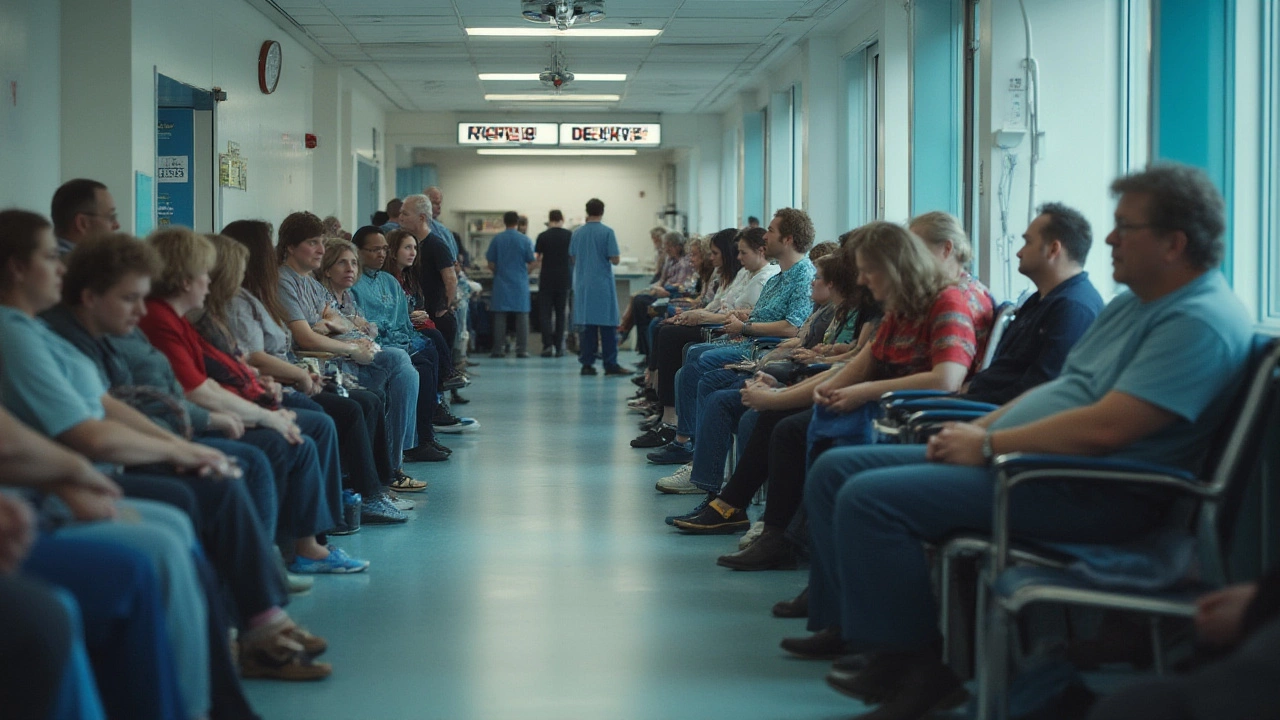
When people talk about health care in the UK, the first thing you usually hear is how lucky Brits are to have the NHS. Free treatment at the point of use sounds like a dream, right? But here’s a reality check: if you’ve ever waited six hours in an A&E (that’s accident and emergency) while sitting next to a guy with a broken arm and a kid with a hacking cough, you know something’s off. It’s not that the NHS is bad—far from it. But let’s get real about where the cracks are showing. There are more than a few. The numbers, the stories, the barely-hidden frustration—let’s dig into what’s not working so well, and why.
Long Wait Times and Delays: The Clock Ticks, But Help is Slow
The one thing every UK resident knows about the NHS? You need to have patience. Lots of it. Let’s take routine surgeries. In 2024, the average wait for some non-urgent operations, like hip and knee replacements, soared over 18 weeks, and people stuck on the list for over a year ran into the hundreds of thousands. The NHS publishes stats that highlight the issue: in August 2024, more than 7.7 million people were waiting to start treatment in England alone. That’s about one in seven people. Hard to imagine that kind of queue at your favorite coffee shop, isn’t it?
Even getting a GP appointment can feel like booking Glastonbury tickets. NHS England reported over 1 million calls a week to GP practices going unanswered. Folks end up trying to sneak in “on the day” appointments at 8 am, pressing redial like it’s a game show. The delay doesn’t just mean inconvenience. Catching a disease early can be the difference between a quick fix and a lifelong struggle, or worse. Cancer referrals missed their two-week target in more than half of cases in 2024—and for diseases like cancer or heart problems, speed literally saves lives.
Emergency services are feeling the pressure too. People in England waited, on average, over two hours for an ambulance after calling 999 for a suspected stroke or heart attack in early 2024. That’s way above the target of 18 minutes. For some, help just can’t come fast enough. Delays lead to stories in the news that no one wants to see. NHS staff are doing miracles under the strain, but when the system gets choked, no amount of heroics can whisk you to the front of the line.
And here’s a tip from those who know: If you can, book appointments as early in the morning as possible. Later in the day, delays snowball. And, don’t skip your yearly screenings—diagnoses caught at an early stage are more likely to get attention quickly, while waiting lists are still somewhat manageable. Here’s a table that shows just how sharp those queues have grown:
| Year | Number Waiting (England) | Average Wait (Weeks) |
|---|---|---|
| 2019 | 4.4 million | 10 |
| 2021 | 5.5 million | 14 |
| 2023 | 7.3 million | 16 |
| 2024 | 7.7 million | 18+ |
Underfunding, Staffing, and the Pressure Cooker Effect
Money doesn’t grow on trees, right? But you’d think it might, considering how often politicians promise to “put more into the NHS.” For years now, there’s been a gap between what the NHS needs and what it gets—especially with a growing, aging population and stubborn inflation making it harder to pay for the basics. In 2024, UK government spending on healthcare was about 10.9% of GDP, less than several European countries like Germany and France, which hover around 12-13%.
Here’s where it bites: not enough cash means wards stay closed, equipment upgrades fall behind, and—most glaringly—there just aren’t enough staff. The NHS workforce is huge, with over 1.3 million people. Yet, there’s a chronic staff shortage across nearly all areas. Vacancies for nurses were still over 40,000 in early 2025, and thousands of hospital doctor positions were unfilled. What does this mean for you? Exhausted staff, less time with each patient, and more risk of mistakes or missed problems.
If you’ve ever felt like your appointment was rushed, that’s not just bad luck. Doctors in some areas report spending just 8-10 minutes per patient, leaving little chance to dig deeper or answer questions. The pressure leads to burnout, sick leave, and a “brain drain”—lots of experienced doctors and nurses heading to the private sector or even abroad for better pay and conditions. Ulster University published a study in 2024 noting that NHS staff dissatisfaction hit a record high, with 40% considering quitting within two years. No wonder you see the same faces less and less.
Sometimes, hospitals just don’t have the beds or enough team members to move patients from ambulances into wards, causing ‘ambulance stacking’ outside hospitals. The Royal College of Emergency Medicine reported patients in England losing an estimated 35,000 hours a week in 2024, just waiting in ambulances. There’s a trickle-down effect—everyone waits, and pressure builds everywhere.
If you’re using NHS services, it can help to stay flexible. Early mornings, and being open to traveling to less busy clinics, especially for non-urgent treatments, can cut your wait. And if you’re worried about repeat cancellations, ask about “cancellation lists” where clinics call you if a slot suddenly opens up last-minute.

Gaps in Coverage, Mixed Quality, and a Postcode Lottery
One thing you learn pretty fast: where you live can have a huge impact on the care you get. Some call it the “postcode lottery.” The NHS tries to offer the same level of care everywhere, but the experience in rural Devon is wildly different from urban London. Cancer drugs that are available in Liverpool might not be approved in a practice in Essex; mental health support in Manchester could look very different from what’s available in Cornwall.
The differences aren’t small. In 2024, average cancer survival rates in parts of northern England trailed those in the South-East by several percentage points, due directly to speed of diagnosis and access to advanced treatments. Life expectancy between the wealthiest and poorest regions in the UK can differ by up to 10 years. This isn’t just a stat—it’s your neighbors, family members, or maybe even you. Mental health is even more patchy: NHS survey data showed waits for talking therapy ranged from a few weeks in central London to over a year in the Scottish Highlands. Some areas are just not funded or staffed to provide modern care. If you have a rare health condition or need a cutting-edge therapy, you might find yourself having to travel far—or being told it just isn’t available at all.
Access to dental care through the NHS is also becoming a unicorn hunt. In 2025, a BBC investigation found 90% of NHS dental practices in the UK were not accepting new adult patients. People are resorting to DIY options—think pulling their own teeth—following stories that would make anyone shudder.
You can’t always move house just for healthcare, but you can look up the best-rated local GP surgeries and specialist clinics using NHS digital tools and patient forums. If you’re struggling to access help, push your GP for referrals, and don’t be shy about asking for alternative treatment locations.
Complex Bureaucracy and Communication Breakdowns
Ever felt like you were being passed from one receptionist to another, explaining your problem over and over, only to end up with no solution? Yep, NHS red tape. The system is big, and that means lots of handoffs, paperwork, and clunky processes. Patients still fax referral letters. Getting access to medical records involves forms, waiting, and sometimes even paying fees. Communication between teams can be a game of broken telephone. It’s not rare for test results to get lost or for appointments to be scheduled and cancelled without clear explanation.
Technology is supposed to help, but it often lags behind. In 2024, NHS Digital said over 40% of NHS IT systems were operating on outdated software. That means slow computers, old booking tools, and frequent “computer says no” moments. It also makes things harder for people with accessibility needs or no internet access. Multiple recent reports found a third of patients struggled to understand letters from hospitals—they’re just not written in plain English. If you don’t chase your own case, things can easily slip through the cracks.
Complaints procedures can also be labyrinthine. Making a complaint may mean filling out a six-page form and waiting months for a response, only to get a generic letter back. It’s easy to feel lost, especially for those dealing with stress or language barriers.
If you’re facing unsuccessful referrals or confusing jargon, ask to speak to the clinic’s Patient Advice and Liaison Service (PALS). They can help explain what’s going on and make sure you’re pointed in the right direction. Keep a notebook of every conversation, date, and name—having details on hand makes following up easier, and you can assert your right to see your records directly.
Still, for every negative, there are millions of success stories each year. But the disadvantages are real and, for too many people, impossible to ignore. The NHS remains a lifeline, but the cracks show up most where it matters—when your health, or the health of someone you love, is on the line. If you’re part of the system, keeping informed, persistent, and prepared can help you get the best from what’s available. Change is slow here, but knowing the system’s sticking points puts you one step ahead.